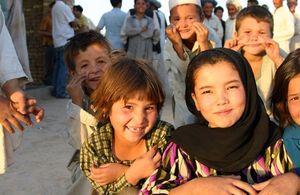Holy See discusses happiness as a measure of the economy
British Embassy hosts conference to examine well-being as a measure of prosperity and sustainable economic development.

Children of Afghanistan
On 28 May 2013, the British Embassy to the Holy See, together with the Embassy of Costa Rica to the Holy See, and in collaboration with the Pontifical Council for Culture, will host the half-day conference: “Well-Being of Society: Happiness as a measure of the economy? A cultural perspective”.
His Eminence Gianfranco Cardinal Ravasi, President Pontifical Council for Culture, H.E. Carlos Roverssi, Vice-Minister of Foreign Affairs of Costa Rica, Glenn Everett, National Director for Well-Being, Office for National Statistics, United Kingdom, and Saamah Abdallah, of the New Economics Foundation, London, will be among the distinguished speakers.
The theme of the conference will be well-being as a more comprehensive measurement of prosperity and sustainable economic development than GDP. One tool that has been developed to measure well-being is The Happy Planet Index (HPI), a new measurement of human well-being and environmental impact, that was introduced by the London-based New Economics Foundation, and takes into account other key issues like the impact of resource use on the planet, and a wider range of social indicators contributing to well-being (such as life expectancy or education).
The conference will explore the concept of well-being as a tool for those who are engaged in politics. It will make a contribution to the cross disciplinary public debate on well-being in international economic, intellectual and religious circles, by posing the question: can we measure, and therefore promote, happiness?
Well-Being of Society: Happiness as a measure of the economy? A cultural perspective
Casa La Salle, Rome, 28 May 2013
Programme
| 9am | Welcome address by Brother Alvaro Rodriguez, Superior General de La Salle Brothers |
| 9.10am | Introductory remarks by H.E. Fernando Felipe Sánchez, Ambassador of Costa Rica to the Holy See |
| 9.20am | Opening Speech by His Eminence Gianfranco Cardinal Ravasi, President Pontifical Council for Culture |
| Interventions | |
| 9.40am | Presentation of ‘Happy Planet Index’, Dr. Saamah Abdallah, The New Economics Foundation, United Kingdom |
| 10.10am | H.E. Carlos Roverssi, Vice Minister for Foreign Affairs of Costa Rica |
| 10.30am | Mr. Glenn Everett, Director of Well-Being, The Office of National Statistics, United Kingdom |
| 10.50am | Debate opened by Dr. Roberto Serrentino, Professor Faculty of Science in Finance E-Campus University, Novredrate (Como), Italy |
| 11.50am | Conclusions by H.E. Nigel Baker, British Ambassador to the Holy See |
| 12.00am | Vin d’Honneur |
Synopsis
There is growing interest around the concept of well-being as a more comprehensive measurement of prosperity and sustainable economic development than GDP. One tool that has been developed to measure well-being is The Happy Planet Index (HPI), a new measurement of human well-being and environmental impact that was introduced by the London-based New Economics Foundation. The HPI is designed to challenge well-established indices of countries’ development weighted predominantly towards the measurement of economic production, but which fail to take account of other key issues like the impact of resource use on the planet, or a wider range of social indicators contributing to well-being (such as life expectancy or education).
Since 2006 NEF has published a world ranking of countries based on its HPI. The most recent index was published in June 2012 and gave its highest rating, for the second time in a row, to Costa Rica. The UK, which has been developing its own national well-being project, has risen consistently on the HPI since 2006, and compares well with other developed European countries.
The debate about well-being in general, and the HPI in particular, has generated a great deal of interest, and some controversy (partly based on its name – NEF sustain that the index is not a measurement of the subjective concept of the “happiest” countries in the world, but rather of the environmental efficiency and capacity to support well-being in a given country). There has also been criticism that the HPI fails to give adequate weighting to critical human rights indicators, thus distorting its final figures. At the same time, it has sparked a global debate on the need to find more sustainable and eco-friendly narratives of economic progress in a world of rapid population growth and dwindling natural resources.
The Embassies of Costa Rica and the United Kingdom organise this joint high level event, in collaboration with the Pontifical Council for Culture, in its economic, social and cultural and always more globalised context, in order to explore the concept of well-being as a tool for those who are engaged in politics, and to make a contribution to the cross disciplinary well-being public debate in international economic, intellectual and religious circles, by posing the question: Can we measure, and therefore promote, happiness?
For further information and registration, please email Simona Prete, Head of Communications, British Embassy to the Holy See. (holysee.press@fco.gov.uk)